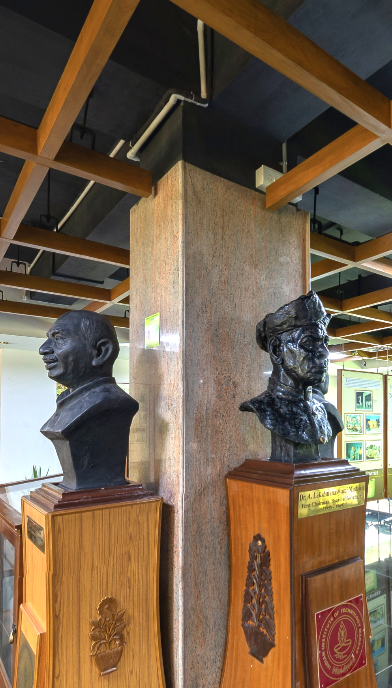Mr. K. T. Chandy addresses the audience at the Special Convocation, 1973
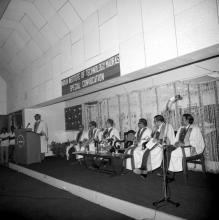
- Photographs , Institute Events, Convocations, Visiting VIPs , 1970s
A special convocation was held for Dr. Erhard Eppler (Minister for Economic Co-operation, Federal Republic of Germany) on 17 November 1973. He was conferred the honourary degree of Doctor of Science. In a report in The Hindu, it is mentioned that Mr. Chandy (Chairman, Board of Governors) welcomed the gathering during the event. Mr. Chandy was the Founder-Director of the first Indian Institute of Management (IIM) in India — IIM Calcutta. He served various positions, as Chairman of Food Corporation of India, Hindustan Steel Limited and Kerala State Industries Development Corporation (KSIDC…
Dr. Erhard Eppler addressing the audience at the inauguration of the Computer Centre, 1973
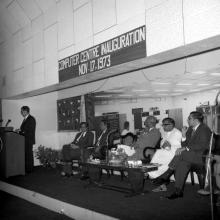
- Photographs , Institute Events, Inaugurations, Visiting VIPs , 1970s
In the book ‘Computer Education in India: Past, Present and Future’, there is a report about the event and some details of Dr. Eppler’s speech. According to the report, Dr. Eppler emphasized on the fact that the newly installed IBM 370 computer at IIT Madras, could be of use in tackling various problems of the country. He also highlighted the fact that no other university in the country had an advanced system such as the IBM 370. Reportedly, he noted that the system would aid the Institute in becoming self-reliant. Dr. Eppler was the Minister for Economic Co-operation for the Federal…
Prof. S. Sampath addresses the audience during the Computer Centre inauguration, 1973
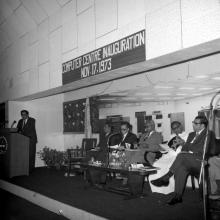
- Photographs , Institute Events, Inaugurations, Visiting VIPs , 1970s
The inauguration took place on 17 November. IIT Madras had recently acquired the IBM 370/155 system with the generous help of West Germany. There is a report of the event in the book ‘Computer Education in India: Past, Present and Future’, where it is mentioned that Prof. Sampath “stressed the need to convince trade union leaders that the use of computers would in the long run result in greater employment.” In the same book, Prof. Sampath’s article notes, “The establishment of the computer centre is the realization of a cherished dream.” IBM made a large mural for the inauguration upon…
Mr. C. Subramaniam taking a look at the 3420/5 Magnetic Tape Subsystem, 1973
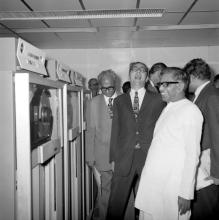
- Photographs , Institute Events, Inaugurations, Visiting VIPs , 1970s
This photograph was taken during the Computer Centre inauguration in 1973. IIT Madras had installed the powerful new IBM 370 computer system at the Building Sciences Block this year, opening up new opportunities for researchers and computing enthusiasts. Campaschimes, the coffee table book about IIT Madras, notes that the tape drives were installed in a hall beyond the card readers (where decks of cards containing programs were submitted for further processing). “The code was compiled and processed in the hall beyond the card reader. The activity in this sanctum sanctorum of the…
Prof. K. A. V. Pandalai welcomes the gathering during the Computer Centre inauguration, 1973
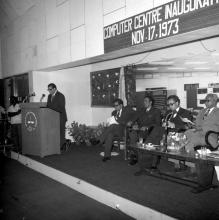
- Photographs , Institute Events, Inaugurations, Visiting VIPs , 1970s
In his speech at the inauguration, Prof. Pandalai expressed interest in IIT Madras becoming self-reliant after the German aid ended. According to a report in the book ‘Computer Education in India: Past, Present and Future’, “He appealed to faculty members to think in terms of promoting self reliance, keeping expectations from others to the minimum.” Prof. Pandalai was the third Director of IIT Madras. He was Director from 1973 to 1977. He is known for having taught the former President of India Dr. A. P. J. Abdul Kalam at the Madras Institute of Technology. In the course of his career,…
Album 0439: Photo contributed by Ms. Sujatha Dube, daughter of Prof. Mahadevan and alumnus of 1983 batch.
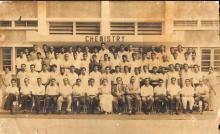
- Photographs
This is a Department of Chemistry photograph in Prof. Mahadevan's collection. Date of photograph: November/December 1967. Seated in the front row, left to right: Prof. V. Mahadevan, Prof. J. Rajaram, Prof. C. Kalidas, Prof. S. R. G. Sarma, Prof. K. Narayanan, Prof. V. Srinivasan, Prof. J. C. Kuriacose, Mrs. Shanti Sengupto, Prof. B. Sengupto, Prof. M. V. C. Sastri, Prof. C. N. Pillai, Prof. G. Aravamudhan, Prof. S. R. Ramdas, Prof. V. Ramakrishnan. There are research scholars, M.Sc. students and members of the support staff among the others in the picture.
Dr. A. Ramachandran confers a degree to a graduate
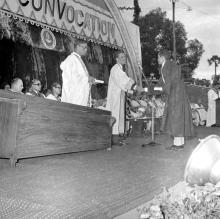
- Photographs , Institute Events, Convocations, Students , 1960s
Seen standing on the stage from the left: Mr. Rajagopalan (Deputy Registrar) and Prof. A. Ramachandran (Director). At the sixth convocation a total of 470 degrees and diplomas (321 B. Tech., 76 M. Tech., 30 M. Sc., 19 Ph. D. and 24 D. I. I. T.) were granted. The Director of the Institite, Dr. A. Ramachandran, handed over the degrees to the students. Dr. Arcot Ramachandran (1923-2018) was the second Director of IIT Madras. He served as Director from 1967-1973, but remained actively connected with the Institute until 2013. Dr. A. Ramachandran was an extraordinary individual and is known…
A student receives an award from Mr. H. V. R. Iengar (Chairman, Board of Governors)
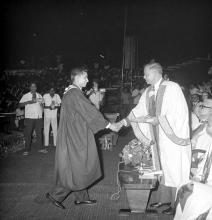
- Photographs , Administrators, Institute Events, Students , 1960s
During the convocation ceremony, apart from the conferment of degrees, it was customary for the Institute to bestow a few special prizes on a select few students. The prizes are: President’s Prize (for the B. Tech. degree student who held the best academic record), Governor’s Prize (for all-round proficiency in the B. Tech. degree course), Institute Special Merit Prize (for the student of the 3-year B. Tech. degree course with the best academic record), Institute Merit Prizes (for the students with best academic record in each discipline of each course) and the Siemens Prizes (presented by M/…
Dr. A. Ramachandran confers a degree to a graduate
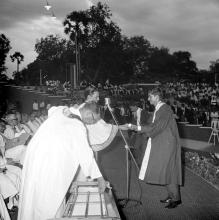
- Photographs , Institute Events, Convocations, Students , 1960s
Seen standing on the stage from the left: Mr. Rajagopalan (Deputy Registrar) and Prof. A. Ramachandran (Director). At the sixth convocation a total of 470 degrees and diplomas (321 B. Tech., 76 M. Tech., 30 M. Sc., 19 Ph. D. and 24 D. I. I. T.) were granted. The Director of the Institute, Dr. A. Ramachandran, handed over the degrees to the students. During the convocation ceremony, apart from the conferment of degrees, it was customary for the Institute to bestow a few special prizes on a select few students. The prizes were handed over to the students by Mr. H. V. R. Iengar (sixth…
Dr. A. Ramachandran (Director) confers a Ph. D. to a student
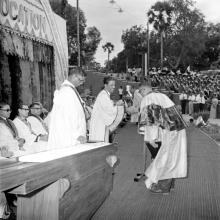
- Photographs , Administrators, Faculty, Institute Events , 1960s
At the sixth convocation a total of 470 degrees and diplomas (321 B. Tech., 76 M. Tech., 30 M. Sc., 19 Ph. D. and 24 D. I. I. T.) were granted. The Director of the Institite, Dr. A. Ramachandran, handed over the degrees to the students. During the convocation ceremony, apart from the conferment of degrees, it was customary for the Institute to bestow a few special prizes on a select few students. The prizes were handed over to the students by Mr. H. V. R. Iengar (sixth Governor of the Reserve bank of India), the Chairman of the Board of Governors.
A student receives an award from Mr. H. V. R. Iengar (Chairman, Board of Governors)
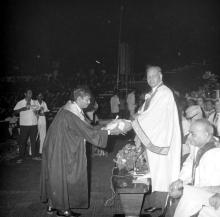
- Photographs , Administrators, Faculty, Institute Events , 1960s
During the convocation ceremony, apart from the conferment of degrees, it was customary for the Institute to bestow a few special prizes on a select few students. The prizes are: President’s Prize (for the B. Tech. degree student who held the best academic record), Governor’s Prize (for all-round proficiency in the B. Tech. degree course), Institute Special Merit Prize (for the student of the 3-year B. Tech. degree course with the best academic record), Institute Merit Prizes (for the students with best academic record in each discipline of each course) and the Siemens Prizes (presented by M/…
The dignitaries stand for the invocation before the commencement of the convocation ceremony
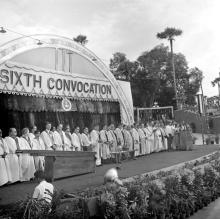
- Photographs , Administrators, Faculty, Institute Events , 1960s
IIT Madras’s sixth convocation was held at the Institute’s Open Air Theatre. The chief guest and speaker at the event was Dr. S. Bhagavantam, Scientific Advisor to the Ministry of Defence, Government of India. Mr. H. V. R. Iengar, Chairman of the Board of Governors, presided over the convocation. In the image, the dignitaries (members of the Council, Senate and Board of Governors) stand during the invocation that took place before the start of the ceremony.
Dr. S. Bhagavantam delivers his address at the sixth convocation
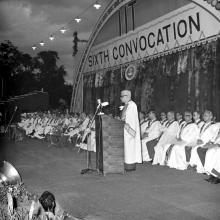
- Photographs , Administrators, Faculty, Institute Events , 1960s
Dr. Suri Bhagavantam (1909-1989), the well-known visionary scientist, administrator and architect of defense research was the chief guest at IIT Madras’s sixth convocation.Dr. S. Bhagavantam was born in Agiripalli, a village in Andhra Pradesh. He completed his primary education in Gudivada and acquired a Bachelor of Science in physics from Nizam College, Hyderabad. He joined Dr. C. V. Raman in Calcutta in the year 1928. After his Nobel Prize winning discovery, Raman chose Bhagavantam as collaborator to further his research work. During this time Dr. S. Bhagavantam got his master’s degree in…
Dr. A. Ramachandran confers a degree to a graduate
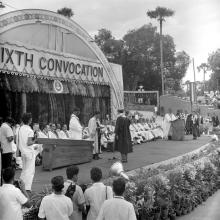
- Photographs , Institute Events, Convocations, Students , 1960s
Seen standing on the dais in front of the degree recipient is Mr. Rajagopalan (Deputy Registrar) and Prof. A. Ramachandran (Director). At the sixth convocation a total of a total of 470 degrees and diplomas (321 B. Tech., 76 M. Tech., 30 M. Sc., 19 Ph. D. and 24 D. I. I. T.) were granted. The event commenced with an invocation, and the ceremony was declared open by Mr. H. V. R. Iengar (sixth Governor of the Reserve bank of India), the Chairman of the Board of Governors. This was followed by the department-wise ‘passing of Grace’. The head of each department respectively supplicates ‘Doth…
A graduate bows to the dignitaries after receiving his degree
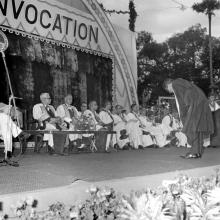
- Photographs , Administrators, Faculty, Institute Events , 1960s
The sixth convocation of IIT Madras was held on 2nd August, 1969. The convocation took place at the Institute’s Open Air Theatre. A total of 470 degrees and diplomas (321 B. Tech., 76 M. Tech., 30 M. Sc., 19 Ph. D. and 24 D. I. I. T.) were granted at the event. The Director handed over the degrees to the students. During the convocation ceremony, apart from the conferment of degrees, it was customary for the Institute to bestow a few special prizes on a select few students. The prizes were handed over to the students by Mr. H. V. R. Iengar (Padma Vibhushan), the Chairman of the Board of…
- Contribute
to the Centre -
Monetary
Support - Digital
Material

